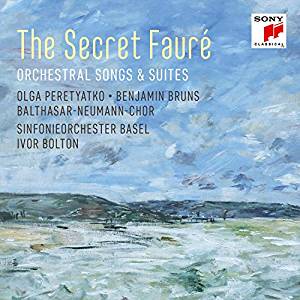The Secret Fauré
View record and artist detailsRecord and Artist Details
Composer or Director: Gabriel Fauré
Genre:
Vocal
Label: Sony Classical
Magazine Review Date: 11/2018
Media Format: CD or Download
Media Runtime: 0
Mastering:
DDD
Catalogue Number: 19075 81858-2

Tracks:
| Composition | Artist Credit |
|---|---|
| Caligula, Movement: Concert Version |
Gabriel Fauré, Composer
Balthasar-Neumann Choir Basel Symphony Orchestra Gabriel Fauré, Composer Ivor Bolton, Conductor |
| Pénélope, Movement: Prelude |
Gabriel Fauré, Composer
Basel Symphony Orchestra Gabriel Fauré, Composer Ivor Bolton, Conductor |
| (4) Songs, Movement: No. 4, Les Roses d'Ispahan (wds. de Lisle) |
Gabriel Fauré, Composer
Basel Symphony Orchestra Gabriel Fauré, Composer Ivor Bolton, Conductor Olga Peretyatko, Soprano |
| (2) Songs, Movement: Soir (wds. A. Samain) |
Gabriel Fauré, Composer
Basel Symphony Orchestra Gabriel Fauré, Composer Ivor Bolton, Conductor Olga Peretyatko, Soprano |
| (2) Songs, Movement: No. 2, Clair de lune (wds. Verlaine) |
Gabriel Fauré, Composer
Basel Symphony Orchestra Gabriel Fauré, Composer Ivor Bolton, Conductor Olga Peretyatko, Soprano |
| (3) Songs, Movement: No. 1, Après un rêve (wds. anon, trans Bussine |
Gabriel Fauré, Composer
Basel Symphony Orchestra Gabriel Fauré, Composer Ivor Bolton, Conductor Olga Peretyatko, Soprano |
| Shylock, Movement: Concert Version |
Gabriel Fauré, Composer
Basel Symphony Orchestra Benjamin Bruns, Tenor Gabriel Fauré, Composer |
| Pelléas et Mélisande, Movement: Orchestral Suite |
Gabriel Fauré, Composer
Basel Symphony Orchestra Gabriel Fauré, Composer Ivor Bolton, Conductor |
Author: Tim Ashley
Caligula was written for an 1888 production of Alexandre Dumas’s play, and refashioned as a concert work for female chorus and orchestra a year later. Much of the music derives from a set of divertissements in the final scene, during which Caligula is lulled to sleep before his assassination, though Fauré also includes ceremonial marches and fanfares from the Prologue. Intended, one imagines, to offset the play’s violence, the score exudes cool, Classical refinement. The choral writing is reminiscent of the Requiem, while the sensuous orchestration strikingly pre empts Debussy, his Pelléas in particular.
Shylock, written for an 1889 adaptation of The Merchant of Venice, is less of a rarity, though it remains infrequently heard. Fauré avoids direct representation of Shylock himself, focusing instead on the play’s lovers. A deeply touching ‘Épithalame’ for Portia and Bassanio, and the exquisite Nocturne for Lorenzo and Jessica are its high points. The actor originally playing the Prince of Aragon was clearly a tenor of some some distinction: Fauré provides him with a wistfully amorous Madrigal to be sung under Portia’s window.
Both performances are strong. With the Basel Symphony on fine form, Bolton teases out Fauré’s textural and emotional subtleties with great care, scrupulously judging both the delicate wit of Shylock and the altogether loftier mood of Caligula. The Balthasar Neumann Choir sound good in the latter: the tenor in Shylock is Benjamin Bruns, warm-toned and very ardent.
Pelléas, however, is fractionally too relaxed, lacking the deeper tensions of Robin Ticciati’s recent DSO Berlin recording (Linn, A/17), though Bolton inserts Mélisande’s Song, in Koechlin’s orchestration, between the sicilienne and Death Scene, where its effect is undeniably chilling. It’s sung, somewhat cautiously, in English by Olga Peretyatko, who also tackles the mélodies. Fauré apparently professed himself indifferent to orchestral songs but nevertheless arranged ‘Les roses d’Ispahan’ and ‘Clair de lune’ himself: ‘Après un rêve’ comes in Henri Büsser’s version, while ‘Soir’ was orchestrated by Fauré’s pupil Louis Aubert. Peretyatko sings them with quiet sincerity but is placed very close to the microphones, which capture an occasional pulse in her voice.
Explore the world’s largest classical music catalogue on Apple Music Classical.
Included with an Apple Music subscription. Download now.

Gramophone Digital Club
- Digital Edition
- Digital Archive
- Reviews Database
- Events & Offers
From £9.20 / month
Subscribe
Gramophone Club
- Print Edition
- Digital Edition
- Digital Archive
- Reviews Database
- Events & Offers
From £11.45 / month
Subscribe
If you are a library, university or other organisation that would be interested in an institutional subscription to Gramophone please click here for further information.






